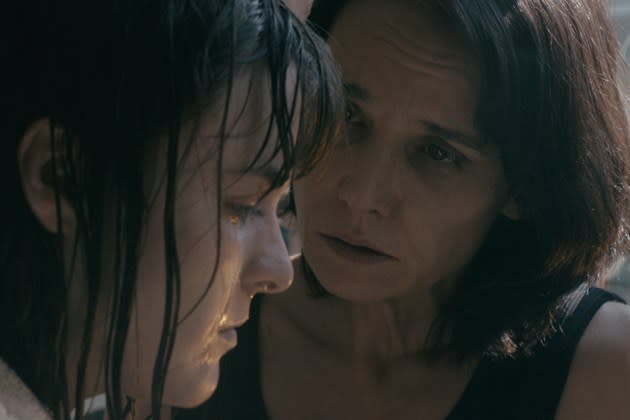Meikincine Nabs International Sales on Reflective San Sebastian Rough-Cut Title ‘Maybe It’s True What They Say About Us,’ From Chile’s Storyboard Media (EXCLUSIVE)

As it plays in competition at San Sebastian’s Works In Progress Latam strand, Buenos Aires-based sales agency Meikincine has swooped on international sales rights for mother-daughter relationship drama “Maybe It’s True What They Say About Us” (“Quizás Es Cierto Lo Que Dicen De Nosotras”).
Produced by Storyboard Media (“Santiago, Italia” “El pacto de Fuga”), the film is directed by Chilean filmmaking duo Camilo Becerra (“El último sacramento”) and Sofía Paloma Gómez (“Quiero morirme dentro de un tiburón”).
More from Variety
“We’re very happy to work with Storyboard Media again, this time in the company of Murillo Cine and Morocha Films, and excited to accompany the film’s international journey,” Julia Meik of Meikincine told Variety. “It’s important for us to be able to bring this very strong story, inspired by a brutal real case, to audiences around the world. The dynamics of family ties, especially those of women, take on great relevance,” she added.
“It’s a film with international commercial potential, with masterful direction and stellar performances in addition to an outstanding level of production,” she added.
Struck between Meikincine’s Lucia and Julia Meik and Storyboard’s Gabriela Sandoval and Carlos Núñez, the deal promises to be a fruitful venture for all.
“We’re very happy about this important agreement with Meikincine, since they’re one of the most important boutique sales agencies in Latin America. We’ve worked together before with excellent results,” Núñez stated. He added, “We’re also very excited about the dimension that the film is taking, with an outstanding cast and the talent of its directors who’ve taken this engaging, universal and incredible story inspired by real events to another level.”
Film is a co-production between Núñez and Sandoval at Chile’s Storyboard Media, Cecilia Salim at Argentina’s Murillo Cine and Lucía van Gelderen at Argentina’s Morocha Films alongside Becerra’s production venture La Jauría Comunicaciones.
The film turns away from the explicit atrocities of the brutal Colliguay occult scandal that rocked Chile, instead exploring the inner workings of a family striving to renegotiate their relationships in the wake of the terror.
“We focus on the family and not on the sect itself because that crime seems unrepresentable to us, if someone wasn’t there to witness it. It seemed much more powerful to us to be on the periphery of that, rather than really deal with what was going to be impossible to transfer to the images,” Gómez explained.
“Perhaps it’s easier to understand the leader of a sect and the people who follow them. In our research, there were many aspects that were somehow linked to unresolved family conflicts, that was the material used by the sectarians as a form of manipulation. It was interesting to see how that operated within family relationships, where are those deficiencies? Where are those gaps that allow someone to end up in the clutches of a sect? That seemed much more interesting, had more depth, than talking about the sect’s leader,” Becerra added.
In the film, Ximena (Aline Kuppenheim) is a successful psychiatrist kept busy tending to patients and dutifully raising a teenager (Julia Lübbert), when the unanticipated reappearance of her estranged daughter Tamara (Camila Roeschmann) casts doubt on the strength of their bond.
As Tamara attempts to ease back into daily life after attending a spiritual retreat shrouded in mystery, their lives are uprooted by an investigation into the death of her newborn child, further threatening the dwindling trust and shoving the family toward near collapse.
The film examines generational trauma, culpability, guilt and interpersonal bonds. Without leading the viewer to a steady conclusion, the project entices discussion and speaks to the desperation inherent in trying to recognize a loved one who’s evolved away from their past and towards an uncertain future.
“We always wanted to avoid playing with the idea of the victim-victimizer, instead, it’s a kind of pendulum that swings from one side to the other. At a narrative level it’s more interesting to discover things, isn’t it? By modifying the perception of the character a little bit, as we add information, it’s as if we’re studying that character, analyzing them, not issuing such a clear-cut judgment,” Gómez stated.
Becerra said: “We play that game for various reasons. It’s the concept that we have of life, of human beings. Nobody’s 100% good or 100% bad. There are mistakes, serious mistakes, less serious mistakes, there’s emptiness, there’s anguish. There is also narcissism, there’s a little bit of everything. We wanted to put all of that on the table.”
The two co-wrote Becerra’s award-winning second feature “Perro Muerto” in 2010 and went on to co-direct “Trastornos del Sueño.” They both agree that the support of a like mind is integral to the craft and that working together is always invigorating and Becerra admitted they’re, “able to reach an agreement and look at things from the same place but we also have different skills. Each of us masters something different in the direction of a project and we complement each other. Everything that’s there in the film is a combination of sensibilities, ideas, perspectives and approaches.”
Best of Variety
Sign up for Variety’s Newsletter. For the latest news, follow us on Facebook, Twitter, and Instagram.

